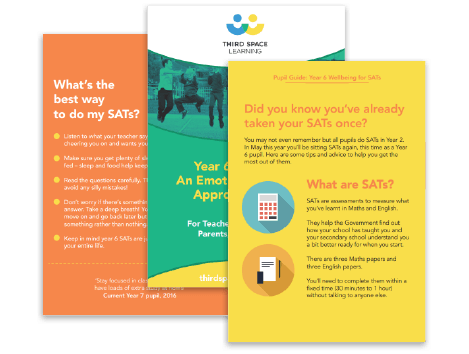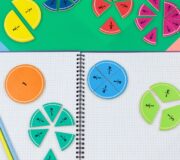How To Support Children Throughout The SATs: Mental Health & Well Being Activities For Children
Ask parents, teachers and other adults in a school if they remember their time in primary school and you will likely be met with recollections of fun times on the playground and learning about everything from vertices through to Victorians throughout the school day.
SATs and mental health was probably the last thing on their minds.
However, fast forward to today and a very different picture would be painted if you asked the current cohort of primary school children, especially after their recent experiences with Covid-19 and school closures and disruptions.
Compared to a decade ago, school life is more intense and children are under more pressure to achieve, and this is having a negative effect on many young minds.
A poll from the Association of Teachers and Lecturers found in 2016 that children as young as six are suffering from exam-related anxiety, and a separate study the year before found that when asked, 76% of primary school teachers (of those in the National Union of Teachers), said that they had seen pupils develop stress-related illnesses in the run up to SATs.
Whilst these stats may put the SATs in a negative light, it doesn’t have to be all doom and gloom when it comes to the infamous Year 6 tests.
There are a number of things you can do to support your child’s mental wellbeing before, during and after the SATs, but first it’s time to take a look at what the cause of this primary school stress could be.
This blog is part of our series of blogs designed for teachers and parents supporting home learning and looking for home learning resources.
FREE SATs Wellbeing Guide
Support Year 6 emotional wellbeing for KS2 SATs with this resource designed by experts.
Download Free Now!So what’s the cause of this primary school stress?
A lot has changed in the primary school classroom since most parents and teachers sat the SATs, and one of the things that has changed most drastically is the Year 6 SATs stress and school exam pressure that some children are now under.
Whilst the causes of primary school stress will vary from child to child, one thing that all children have in common is the SATs, and this seems to be a huge source of anxiety for many.
The report by the National Union of Teachers discussed the fact that even when primary school teachers specifically set out to ‘protect’ their pupils from the pressures of the tests, they still reinforced the importance of them by regularly mentioning them, which in turn increased the pressure the children were feeling.
With most schools putting an emphasis on the SATs, whether intentionally or not, children are becoming stressed and anxious when the exams come around.
For example, those that are high achievers have a tendency to compete against others to be the best, and this can then cause stress if they fall short of their self-imposed target. Children that find school difficult often also feel worried about the SATs as the tests have been spoken about by their teachers, parents and friends, making these tests out to be a much bigger issue than they should be for a 10 or 11-year-old child.
It is clear then that SATs are causing stress in the primary classroom, but how will you know if your pupil or your child is suffering from it in the run up to the tests?
Read more: What Are SATs?
How to know if a child is stressed about exams – the warning signs of SATs stress
As a parent you know your child better than anyone and teachers will see pupils daily, but it can still be difficult to spot the symptoms of primary school, or more specifically SATs stress, if you don’t know what you are looking for.

With young children often finding it difficult to verbalise their feelings, it can be hard to know when to step in and help, but here are a list of potential stress indicators to look out for in your child:
- Extreme emotional reactions to small stimuli – If a child makes a small mistake in their work and their reaction to this is disproportionate, they may be under stress.
- A desire to not go to school – If a child is adamant that they ‘don’t want to go into school’ around the time of SATs, stress could be the cause.
- Stress manifesting as physical problems -Stomach aches, headaches or other physical complaints could be caused by stress.
- Low self-esteem – If you hear a child referring to themselves as ‘stupid’ or telling themselves that they are ‘bad’ at certain things, this could be stress talking.
- Changes in their regular daily patterns – Sleep & eating times changing could indicate stress.
- Not wanting to talk about school work or the SATs – As parents, it is normal to get a response along the lines of “I don’t know, some fractions” when you ask what your child got up to at school that day, but if you notice that their answers to this question are becoming less and less thorough, stress could be to blame.
Of course, this is not an extensive list and ultimately as mentioned above, parents know their child better than anyone so as a teacher, if you notice anything out of the ordinary in their behaviour, open up a conversation with the pupil and parents to see how they are feeling. As a parent, you can start this conversation with your child.
Now it is time to take a look at some of the ways you can help prevent/manage stress levels in a child in the run up to SATs.
How you can tackle SATs stress in the run up
The period before the SATs begin can be a testing time for primary school children. As a teacher, you can advise parents on how to support their children with stress with the tips below.
1. Reduce stress levels over the weekend
Children will likely spend a large amount of their time in the classroom preparing for the SATs in the run up to the tests, so parents can try to ensure that the weekends at home are as stress free as possible.
The last thing a child wants is to be thinking about their tests 7 days a week, so parents should try to avoid doing any stressful activities with them over the weekend and incorporate fun and engaging revision strategies.
2. Don’t add to the pressure
As discussed above, children often put pressure on themselves to achieve well in their tests. So, by not adding to this already existing pressure, parents will be helping them to relax a little.
It is important as both parents and teachers to let children know very early on that whatever happens in the tests, that you are proud of them.
3. Put the tests into perspective
To a young mind that is fully immersed in the world of SATs, at the time of sitting them they can seem like the most important thing in the entire world.
It’s both the parent and teacher’s job to tell them that this isn’t the case, and one way to help a child remain stress-free is to remind them that whilst they should try their best, that nothing bad will happen if they don’t get the results they want in their SATs.
4. Help them to revise
This sounds simple, but parents helping children from home to revise could be the catalyst that encourages them to finally figure out fractions or decipher decimals.
By having someone at home who can point them in the right direction if they make a mistake, children won’t get as stressed as they otherwise could when doing their revision if mum or dad wasn’t on hand to help out.
There are a lot of free resources parents can use to help children revise before the SATs on the Third Space Maths Hub.
5. Talk about their stress AND listen
This is one of the most important pieces of wellbeing advice you will read in this blog.
It is crucial that parents speak to their child and ask them about any fears or worries they may have about the SATs, and then help them put them in perspective.
For parents, remember you are someone that your child trusts, so by simply listening to their problems you will be able to help relieve any stress that is forming in the run up to the tests.
6. Talk to their teacher to find out what they are stressed about
Teachers are the people who work with children in the classroom on a daily basis, and they will best understand what a child is feeling before the SATs.
As a teacher, open a dialogue with parents, and allay parent fears and offer support on these issues.
7. Plan something fun for the weekend before the tests
By the time SATs week rolls around, children will probably be sick of hearing those three letters, so to help cheer them up and reduce stress-levels, parents could arrange something fun for the weekend before the tests take place.

Swimming, the zoo or even something adventurous like visiting a Go Ape centre to climb amongst the trees can all help to lessen the worry of the incoming SATs tests for a primary school child.
8. Remind them of the things SATs can’t test, namely other subjects and their personality!
Due to the requirements from the government, the SATs are very limited in what they can test and this is something that you should remind your child of too.
You may have a budding historian on your hands, or a child may be reminiscent of a young Mo Farah on the running track, so if you have a child or a pupil in your class that is feeling pressure from the SATs, just remind them of all the skills they have that won’t be shown in their SATs results!
9. Remind them that it’s only one-week of tests and they are done!
All of the SATs are sat over a 1-week period in May, and whilst this may seem like a daunting prospect to young minds it is actually a blessing in disguise as once this week is over, so are the SATs!
10. Use the right language – no pass or fail mentions
Encourage parents to set the appropriate tone in their households in the run up to SATs. It is important to remember to use the right language.
There should be no mentions of “passing” or “failing”, and parents should look to replace any negative phrases they may say with positive ones. Examples of this are:
“I can’t do this, I think it’s too hard” becomes “I am going to work hard to get better at this.”
and
“I feel stupid” becomes “I only feel like this right now because I’m nervous about the tests.”
11. Explain how anxiety and stress can feel in case they don’t know what they are feeling
As children are at a young age when they sit the SATs, they may not know how to describe what they are feeling at the time as this may be their first incidence of anxiety or stress.
So, encourage parents to sit down with their child and discuss with them the physical and mental effects of both anxiety and stress, so that if they are feeling either of them they will be able to articulate it clearly and help can be sought.
Take a look at this video from ChildLine which explains the above in child friendly terms.
How you can tackle stress during SATs Week
If SATs week has arrived and your child or pupils are feeling the pressure, don’t worry as there are a number of things you can do to help them get through this potentially stressful week!
1. Have a SATs ‘reward week’ breakfast or dinner (or both!)
A simple way to give children something to look forward to during SATs week is to let them choose what they would like for dinner or breakfast. Teachers could even organise something at school.

It might involve having to make two dinners, or taking a trip to their favourite restaurant, but it will be well worth it to reduce any potential stress.
2. Talk about their stress and listen to them
SATs week is the time when stress could really ramp up for children, so make sure you listen to their worries. Parents can discuss with them how their day went at school. This is a very effective, yet simple way to lessen school exam pressure.
3. Find small things that will help them relax
Whether it is playing with the family dog, kicking a football around outside, or watching their favourite episode of a cartoon series for the 1,000th time, finding the small things that help your child to relax is very important during SATs week.
These small patches of relaxation are crucial for children to recharge their batteries and be ready for whatever else is coming up in their week.
4. Encourage them to exercise
Something that most people are guilty of is not making as much time for exercise as they should, and this is a very important thing to do for children during SATs week.
Taking 10 minutes to walk around the block, or half an hour to go swimming can really help stress hormones to disappear, and when paired with healthy eating and drinking plenty of water you can almost guarantee that a child will be ready to take on the tests!
Teachers can also organise a small activity to keep pupils active during SATs week.
5. Remain positive whenever you are around your child
To put things simply, if your child sees you being negative, this attitude will soon pass down to them.
Keep things as positive as possible around the house and the classroom, and a child will feel the same way and you’ll see a reduction in the levels of SATs anxiety.
6. Ensure that siblings are nice throughout SATs week – they might have been there and done it already but they still need to show support!
In the eternal battle of sibling vs sibling, it can be difficult to ensure that both are on the same page for anything.
However, during SATs week, as a parent, try to ensure that any siblings your child may have are supportive as opposed to disruptive, as difficult as that may be…..
7. No screens for half an hour before bed
Again, this is something we should all be doing but rarely manage to, so during SATs week try to ensure that your child has 30 minutes of screen-free time before they go to bed to make sure that they get a good night’s sleep.

8. Make sure they are in school with plenty of time to spare – no rushing means no stress
The school run is no easy thing, but give yourself an extra 10 minutes in the morning during SATs week to ensure that there is no rushing on the way to school.
By arriving early, it gives your child time to relax and prepare for the coming day, and this is much better than rushing through the gates at 8.44am for an 8.45am start!
As teachers, you could invite parents and pupils into class earlier and if possible, provide a warm, dry room with refreshments to support a calm start to the morning.
9. Make sure they are prepared on the day with everything they will need
There is no worse feeling than getting to an exam or test and realising that the pen you have doesn’t work, or realising that you are extremely thirsty just at the timer starts! These are stress multipliers!
So, to prevent this from happening, make sure children have everything they need to smash the SATs including:
- Pens
- Pencils
- A rubber
- A ruler
- A sharpener
- A bottle of water
- Tissues
As teachers, remind parents of the equipment pupil’s may need with plenty of time and consider keeping some spares for children who forget on the day.
10. Go through exam technique with them
During SATs week it’s likely to be too late to revise the subjects themselves without stressing a child out, but parents can revise exam technique with them.
Remind them to read every question carefully before they answer, to double check their answers before they move on, and to answer the questions they are comfortable with before attempting the others.
How you can tackle stress after SATs Week
Once SATs week is over, any stress a child may have been going through will certainly be lessened, but it may not necessarily be gone completely.
It is important that parents keep an eye on their child to ensure that they aren’t worrying about how the tests went, and that they enjoy the time they now have before moving onto secondary school!
The following tips should help parents to do this!
1. Make sure you are there on time after each exam to collect them
After finishing all of their SATs, it is important that you are there on time at the school gates to collect them and help put the memory of the tests behind them.
You could also bring a special treat with you as a reward for them finishing the tests!
2. Clear away all of their revision items before they get home to make sure they aren’t thinking about SATs
Once you have sent your child off to school to sit their final SATs test, you should spend some time tidying the area they have been using to revise.
Upon their return home the last thing they are going to want to be greeted by is a reminder of the SATs they have just completed, so pack away the pens and pads before they get home!
3. Help them relax before bedtime to get a good night’s sleep
It’s been a busy week for your child, so after the tests are finished help them to relax before bedtime by running them a bath, drawing with them or even reading a book together.
Your child will probably enjoy a more laid-back activity after the stresses and strains of SATs week, so find what works for them and help them relax!
4. Get life back to normal as quickly as possible
Now that SATs are done, look to get family life back to normal as quickly as possible. If Taco Tuesday had to be postponed due to SATs revision, bring it back the following week.
If Wednesday’s football training was put on-hold, lace those boots up again.
Whilst it is important to ensure that your child keeps up to date with their school work post SATs, make time to fit in a number of fun things to do with them now that the summer is (almost) here!
5. Remind them that SATs are now done and there is nothing they can do.
This is probably the most important piece of advice to be found in this blog, as once the tests have been sat it is important to remind your child that they have done all they can and that they can do no more.
Let them know that you are proud of them for sitting the tests and doing their best whatever the results are, and that they should not waste any time thinking about them now.
Do you have any other tips for dealing with school exam pressure and reducing stress during SATs week?
We are always looking to expand our blogs with advice from parents, so if you have any additional tips and tricks you use during SATs week, let us know via our Facebook or Twitter pages and we will add it into the post!
Further reading
DO YOU HAVE PUPILS WHO NEED MORE SUPPORT IN MATHS?
Every week Third Space Learning’s specialist primary maths tutors support thousands of students across hundreds of schools with weekly online 1 to 1 maths lessons designed to plug gaps and boost progress.
Since 2013 these personalised one to one lessons have helped over 150,000 primary and secondary students become more confident, able mathematicians.
Learn about the SATs revision programme or request a personalised quote for your school to speak to us about your school’s needs and how we can help.





